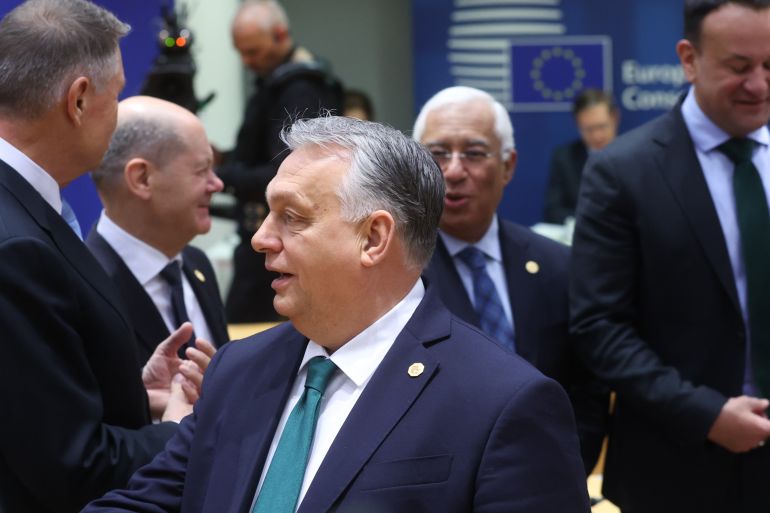European Union agrees on new $54bn aid package for Ukraine
Hungary previously vetoed the measure and criticised the bloc’s military support for Ukraine.

All 27 European Union countries have agreed on an additional 50-billion-euro ($54bn) aid package for Ukraine, despite threats from Hungary to veto the move.
“We have a deal,” European Council President Charles Michel said in a post on X on Thursday, just an hour into a special summit of EU leaders in Brussels.
Keep reading
list of 3 itemsIs Zelenskyy planning to fire Ukraine’s popular top army commander?
Russia-Ukraine war: List of key events, day 708
Michel said the move “locks in steadfast, long-term, predictable funding for Ukraine” and demonstrates that the “EU is taking leadership and responsibility in support for Ukraine; we know what is at stake“.
We have a deal. #Unity
All 27 leaders agreed on an additional €50 billion support package for Ukraine within the EU budget.
This locks in steadfast, long-term, predictable funding for #Ukraine.
EU is taking leadership & responsibility in support for Ukraine; we know what is…
— Charles Michel (@CharlesMichel) February 1, 2024
Ukraine’s President Volodymyr Zelenskyy said the EU’s approval of the aid package would strengthen long-term economic and financial stability as the war with Russia approaches its third year.
“It is very important that the decision was made by all 27 leaders, which once again proves strong EU unity,” he posted on X.
‘Until victory’
Ukraine has become increasingly desperate to secure funding from Western countries in recent months, with political delays to both US and EU aid bolstering Russian confidence amid the bogged-down war.
Grateful to @CharlesMichel and EU leaders for establishing the €50 billion Ukraine Facility for 2024-2027.
It is very important that the decision was made by all 27 leaders, which once again proves strong EU unity.
Continued EU financial support for Ukraine will strengthen…
— Volodymyr Zelenskyy / Володимир Зеленський (@ZelenskyyUa) February 1, 2024
In December, the bloc agreed on the latest aid package, which would run through to 2027, and decided to make Ukraine a candidate for EU membership, which Hungary’s Prime Minister Viktor Orban reluctantly accepted.
But Orban, who has close ties to Russian President Vladimir Putin, was angry at the European Commission’s decision to block his government’s access to some of the bloc’s funds, which they did over concerns about possible threats to the EU budget by Hungary.
In response to the lack of access, Orban vetoed several issues at the EU.
“I don’t want to use the word blackmail, but I don’t know what other better word” might fit, Estonian Prime Minister Kaja Kallas told reporters as she arrived for Thursday’s crunch meeting.
“Hungary needs Europe,” she said. “He should also look into what it is in it for Hungary, being in Europe,” added Kallas, referring to Orban.
After the deal was sealed, Kallas noted that it was an “important signal to Ukraine that the EU stands behind you long-term, until victory”.
Latvia’s Prime Minister Evika Silina also posted on X that the agreement was “excellent news for the security of Latvia and all of Europe”.
‘Great sense of relief’
Ukraine expects to receive the first tranche of 4.5 billion euros ($4.9bn) from the EU facility in March, the Ministry of Economy said on Thursday.
Reporting from Kyiv, Al Jazeera’s Rob McBride said there was “a great sense of relief” in Ukraine after the announcement of the deal.
“This guarantees funding for four years, so it gives a longer-term sense of security. There’s also a lot of talk here about some of these funds going into an investment fund to try to attract private sector investment,” he added.
Orban said that he had received guarantees about billions of euros in suspended EU aid in return for lifting Hungary’s veto.
“We finally negotiated a control mechanism to guarantee that the money would be used sensibly, and we received a guarantee that Hungary’s money would not end up in Ukraine” he said.
Reporting from Brussels, Al Jazeera’s Natacha Butler said the EU were keen to send a message of unity.
It was important for the EU “to send the message to Moscow that they are united when it comes to Ukraine, particularly in a difficult year in which we have the US elections – they know there is a lot of uncertainty ahead”, she added.
The EU funding is especially significant as a similar aid package from the US continues to be blocked due to internal political disputes and is further complicated by the presidential election in November.
“US funding to Ukraine became a hostage of domestic US politics,” Hlib Vyshlinsky, executive director of the Centre for Economic Strategy, told Al Jazeera.
“It was very hard for Ukraine to do anything with it in a year of presidential elections in the United States.”